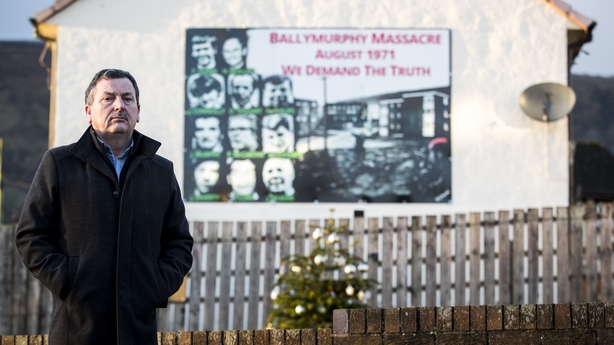John Teggart, whose father Danny was shot at Ballymurphy in 1971, said that the feeling of victims' families is "anger" following a letter of apology from British Prime Minister Boris Johnson.
The Ballymurphy families met this lunchtime to discuss the letter and held a meeting with Sinn Féin leader Mary Lou McDonald.
John Teggart said the letter was sent "two minutes" before the Northern Ireland Secretary of State Brandon Lewis delivered a public apology at Westminster this morning.
The events of 1971 are referred to by the families as the "Ballymurphy massacre" but Mr Teggart said that the letter made no mention of a massacre.
"If this was to be done right, [Boris Johnson] would've sat back, he would've took his time and consulted with the families before he put that out," he said.
"The manner in which he has done it is totally unacceptable to all the families," he said.
He said families want Boris Johnson to "do this thing right" and speak to the parliament, the people of Northern Ireland and also the world about what happened in Ballymurphy.
Sinn Féin leader Mary Lou McDonald said the way Mr Johnson approached the apology was "botched" and that the apology is the "least these families are entitled to".
Speaking to the media after meeting the families in west Belfast, she said: "After half a century of denial and lies frankly, after half a century of struggle by these families to get to the truth, to have the truth pronounced loudly for the world, I believe the respectful thing is not to write them a letter through their solicitor or to offer them up a half-baked second-hand apology.
"I believe the dignified thing is to recognise these families, meet with these families and to provide a fulsome public apology that recognises the full calamity that was visited on their family, the full human loss and also the fact of the murderous behaviour of British troops in Ballymurphy and elsewhere in Ireland all those years ago."
She said the Ballymurphy families are "heroic" and had shown dignity, courage, resilience and stamina.
Ms McDonald said she believes Mr Johnson should engage directly with the families. There are mixed views among the families over whether they would want to meet Mr Johnson.
Ms McDonald said the very idea that the British government is considering introducing an amnesty [for British state forces] is "unthinkable".
The UK is reportedly set to introduce a statute of limitations to stop people being charged over offences that occurred before the Good Friday Agreement.

Earlier, a former British army chief said he was "surprised" that Mr Johnson had previously only issued an apology by phone with Northern Ireland political leaders regarding the Ballymurphy massacre.
Richard Dannatt, now a member of the House of Lords, said he does not think the British government is going to suggest an amnesty but rather have a qualified statute of limitations.
This means that any offences committed before the Good Friday Agreement would not be subject to further prosecutions. "That applies to everyone, civilians and military," he said.
Mr Dannatt said while this decision would be controversial, it it might allow investigators to get truthful answers about what happened to the victims.
"Once the threat of prosecution is lifted, we are much more likely that investigators asking questions will get truthful answers and get a greater sense of truth and potential reconciliation, even if it is not truth leading to justice," he added.
Speaking on RTÉ's Morning Ireland, Mr Dannatt said that in principle he would agree that those involved should face prosecution for the massacre in Ballymurphy in 1971 but questioned 50 years on how reliable the evidence and witnesses would be.
He referred to the collapsed trial of soldiers A and C recently and said it is hard to get conviction on unreliable evidence.
Mr Dannatt, who was stationed in Northern Ireland, said without reliable evidence it is hard to get prosecutions and instead "the least worst option" in his view is to have a statute of limitations to get the truth about what happened.
He also said the British government must talk to the Irish Government and try to get widespread support for whatever it is going to try to do and "not ram things in unilaterally".

